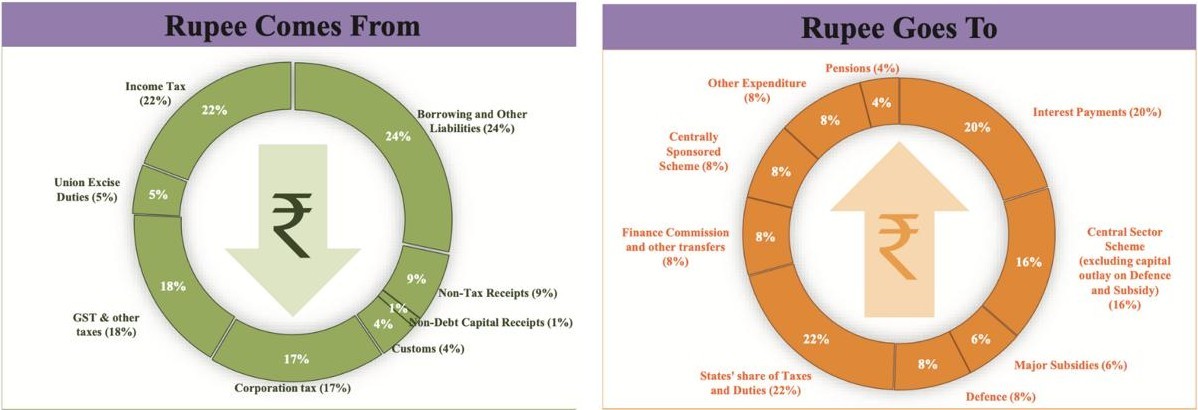Union Budget 2025: A New Era of Financial Empowerment
The Union Budget 2025, presented by the Hon’ble Finance Minister on February 1, 2025, has introduced a series of strategic reforms aimed at bolstering the real estate sector. These initiatives focus on accelerating stalled projects, fostering urban development, and providing financial relief to homebuyers and developers.

The much-anticipated Union Budget 2025 has been unveiled, bringing a mix of opportunities and challenges for the real estate sector. But one of the most significant takeaways from this budget is the revamped income tax structure, ensuring higher take-home salaries for millions of taxpayers. With more disposable income in hand, real estate is poised to benefit as one of the most attractive investment avenues.
Key Highlights of the Budget for Real Estate
1. SWAMIH Fund 2: Boost for Stalled Housing Projects
● To address delayed projects, the government has announced SWAMIH Fund 2 with a ₹15,000 crore corpus.
● This blended finance facility, backed by the government, banks, and private investors, aims to complete pending housing projects and provide relief to thousands of homebuyers awaiting possession.
2. Affordable Housing Gets a Push
● The definition of affordable housing has been revised to reflect market realities.
● The price cap for an affordable home has increased from ₹45 lakh to ₹90 lakh, with a 5% annual increment to adjust for inflation.
● The government is considering a Credit Guarantee Scheme for home loans up to ₹70 lakh to encourage homeownership.
3. ₹1 Lakh Crore Urban Development Challenge Fund
● The ₹1 lakh crore Urban Challenge Fund is set to transform city infrastructure, sustainability, and livability, boosting real estate demand in urban areas.
4. Tax Reforms & Incentives for Homebuyers
● Reintroduction of Section 80-IBA Tax Benefits: A 100% tax exemption for affordable housing projects, discontinued in 2022, is expected to return.
● Home Loan Interest Deductions: A proposal to allow unlimited deductions on home loan interest for first-time homebuyers.
● Stamp Duty Rationalization: A move to standardize stamp duty rates across states, reducing the financial burden on property buyers.
5. GST & Capital Gains Tax Adjustments
● Unified GST Rate for Housing: Merging the 1% and 5% GST slabs into a single 1% rate across all housing categories is under consideration.
● Capital Gains Tax Reforms:
- Long-term capital gains tax may be reduced from 20% to 10%.
- The holding period for capital gains tax exemption could drop from 24 months to 12 months.
6. Credit-Linked Subsidy Scheme (CLSS) for Youth
● With two-thirds of India’s population under 40, the government plans to reinstate CLSS under PMAY for first-time homebuyers, valid until December 2025.
Income Tax Changes & Their Impact on Real Estate
The government’s major revamp of the income tax structure under the new tax regime means more money in the hands of salaried individuals. But where will this extra cash flow go? Real estate investments are expected to surge as homebuyers and investors capitalize on higher savings.
1. Revised Income Tax Slabs: More Take-Home Pay
● The new default tax regime has completely overhauled income tax slabs, making tax liability lower for individual.
New Income Tax Slabs for FY 2025-26
2. Higher Tax Rebates = More Disposable Income
● Tax rebate under Section 87A increased from ₹25,000 to ₹60,000, ensuring zero tax on incomes up to ₹12 lakh (compared to ₹7 lakh earlier).
● Basic exemption limit increased from ₹3 lakh to ₹4 lakh, further reducing tax burdens.
3. Standard Deductions & Employer Contributions Remain
● Employees can still claim a ₹75,000 standard deduction from salary income.
● 14% of basic salary as employer’s contribution to NPS Tier-I remains tax-free.
Why Real Estate Will Benefit from These Changes
More Take-Home Salary = Increased Homebuying Potential
● With lower tax liabilities and higher disposable incomes, professionals will be in a better position to invest in real estate.
Homes Become More Affordable
● Young homebuyers, previously priced out of the market, will find it easier to purchase their first home.
● Government-backed schemes like PMAY and CLSS are expected to drive demand in the ₹50-90 lakh price range.
Investors Gain from Tax Benefits
● The lower long-term capital gains tax (from 20% to 10%) makes real estate a more attractive investment than stocks or mutual funds.
● The holding period for capital gains tax exemption is now just 12 months instead of 24 months, allowing faster property sales.
Rental Market to See a Boom
● As more people migrate to urban areas, rental demand will rise.
● Investors looking for stable rental income will see higher occupancy rates and better returns.
Tax Relief for Two Self-Occupied Properties
In a significant move, Finance Minister Nirmala Sitharaman has relaxed the conditions for tax relief on self-occupied properties in the 2025 Union Budget.
● Taxpayers can now claim tax benefits for two self-occupied houses, a major change from the previous rule that allowed relief for only one property.
● This reform eases the tax burden for individuals who own and live in multiple properties, offering financial flexibility and promoting homeownership.
● By acknowledging the diverse housing needs of families, this decision provides greater tax relief while encouraging real estate investment.
● This move aligns with the government’s broader focus on financial empowerment and ease of living, strengthening the middle class while simplifying the tax structure.
Impact on Key Stakeholders
| Stakeholder | Impact |
| Homebuyers | Increased affordability, better loan schemes, and tax relief. |
| Developers | Faster project completion, tax benefits, and infrastructure push. |
| Investors | Higher returns with capital gains tax benefits. |
| Real Estate Market | Expected surge in housing demand and new project launches. |
Final Thoughts: A Win-Win for Employees & Real Estate
The Union Budget 2025 not only focuses on infrastructure and housing but also ensures that individuals take home more of their hard-earned money. This shift is expected to fuel demand for residential properties, making 2025 a breakout year for real estate investments.
Whether you’re a first-time homebuyer, investor, or developer, this budget sets the stage for growth, stability, and financial security in the real estate sector.
At Ceyone, we see this as an opportunity to further simplify and empower the home-buying journey—whether it’s helping homebuyers make informed choices, supporting developers with digital strategies, or ensuring seamless transactions in the resale and rental space.













